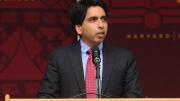Noting that “we are in the early stages of an inflection point that may be larger than those caused by the printing press and the Industrial Revolution,” educator and entrepreneur Salman Khan, M.B.A. ’03, told the Harvard Business School’s class of 2014 to take advantage of the rare opportunities they’ve been given and “surrender your individual ego and aspirations to something bigger than yourself.”
The founder of Khan Academy, a free, online, heavily math- and science-focused education platform used by millions of students and teachers around the world, Kahn addressed students and their families on Class Day. He opened by recalling his own arrival on campus 13 years ago at the Spangler Center, which he likened to a five-star hotel with its marble fireplace and leather couches, where he sat down to watch “the well-shampooed squirrels happily prance outside on the lawn.” (From the dais on Wednesday, Khan personally thanked C.D. “Dick” Spangler, M.B.A. '56, LL.D. ’13, who was sitting 10 feet away in the audience, for that opportunity.)
During his second week of school, terrorists flew airplanes into the World Trade Center towers. Whatever insecurities the place and its “unnaturally articulate and thoughtful” students and professors engendered, Khan said, were muted by a growing sense that he and everyone around him were not competitors but “all just creatures in a world that we didn't understand.”
That world is now engaged in a seismic shift with uncertain outcomes. “For better or worse, centuries-old institutions and frameworks are being challenged, and this trend only seems to be accelerating,” he added. “I believe this phase of history may rival the development of agriculture in redefining the potential of the human species.”
Certainly education, Khan's admitted passion, has seen astronomical growth in terms of applying technologies to reach and teach a widening population. But even across all industry sectors—healthcare, media, finance, manufacturing, and government—he explained, this historic period provides “the chance to push whole areas of our society forward”—but only if those with the “intellect, energy, and credibility—i.e., you—think about the bigger picture.” He implored the degree candidates to think “on a time scale longer than the human lifespan, much less the next bonus period...on a scale larger than your direct family, social circle, firm, or country.” And to change perceptions, where necessary. View the firm "not as a tool to maximize profit, but [view] profit as a byproduct of maximizing global happiness," he urged. Harvard Business School describes its students as “leaders who make a difference in the world,” Khan pointed out, adding that leaders “don't assume the current reality is a given.”
In addition to Khan and others, Harvard Business School graduating senior Casey Gerald, M.B.A. ’14, gave a speech on Class Day. The native Texan, who earned his undergraduate degree in political science from Yale, is the cofounder and CEO of MBAs Across America, a nonprofit, start-up company that couples young or aspiring MBAs with entrepreneurs to work on real projects and problems and act as catalysts for practical solutions. Watch Gerald discuss his personal experiences and vision here.









